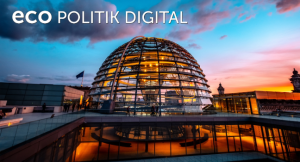A backlog of digital legislation is jeopardising security and innovation
The last German Bundestag session of the 20th legislative period has come to an end – and elections will take place in just over a week. eco – Association of the Internet Industry points out that numerous regulatory initiative relevant to the Internet industry have not been completed, partly due to the collapse of the German traffic light coalition. These include, in particular, security-related policy initiatives such as the NIS2 Implementation Act, the Quick Freeze Act and the right to encryption. The eco Association calls for the new government to address the necessary legal clarifications for businesses as quickly as possible after the election.
“These laws would have helped to strengthen digital security and privacy in Germany. Their failure due to political discontinuity is a missed opportunity,” says Oliver Süme, Chair of the Board at eco. “It is therefore crucial that the new German federal government treats these initiatives as a priority.”
After the election, speed is essential: Legal uncertainty stifles innovation
The premature end of the traffic light coalition has also caused delays in the transposition of further European Regulations into national law. eco Association therefore believes that clarity in AI regulation must be established as a matter of urgency after the election. “Especially in such a highly competition field like AI, we cannot afford to withhold investments and falter innovations just because the legal framework in Germany is not clearly defined,” warns Oliver Süme. As Süme also notes, the next German federal government must establish legal clarity as quickly as possible.
Digital Germany 2030: eco publishes agenda for a digital policy fresh start
Germany’s digitalisation structures and framework conditions are inadequate. Many critical digital policy challenges have not been addressed during this legislative period. In order to successfully advance the digital transformation in the next legislative period, eco’s Internet Policy Agenda calls for a clear vision of “Digital Germany 2030” based on the coalition agreement, as well as a fundamental restructuring of the digital policy decision-making processes. In the future, the most crucial role in this transformation should be played by a dedicated Ministry of Digitalisation equipped with its own budget and acting as the central governing body to promote digitalisation across all departments with binding regulations.
Oliver Süme: “Digitalisation is the key to competitiveness and a sustainable transformation of our economy. The next German federal government must resolutely drive digital transformation, consistently implement digital framework conditions, and ensure coordination through a Ministry of Digitalisation.”
eco is conducting a Party Policy Check on the Internet this evening
On 11 February 2025, eco will be hosting “Wahl/Digital 2025”, a major Internet Policy Party Check. This will feature leading digital politicians, including Franziska Brantner (Alliance 90/The Greens) and Christian Lindner (FDP), who will discuss their concepts for Germany’s digital future.
Now you can download eco’s Internet Policy Agenda, and an eco Assessment of Election Programmes for the 2025 German federal election.




